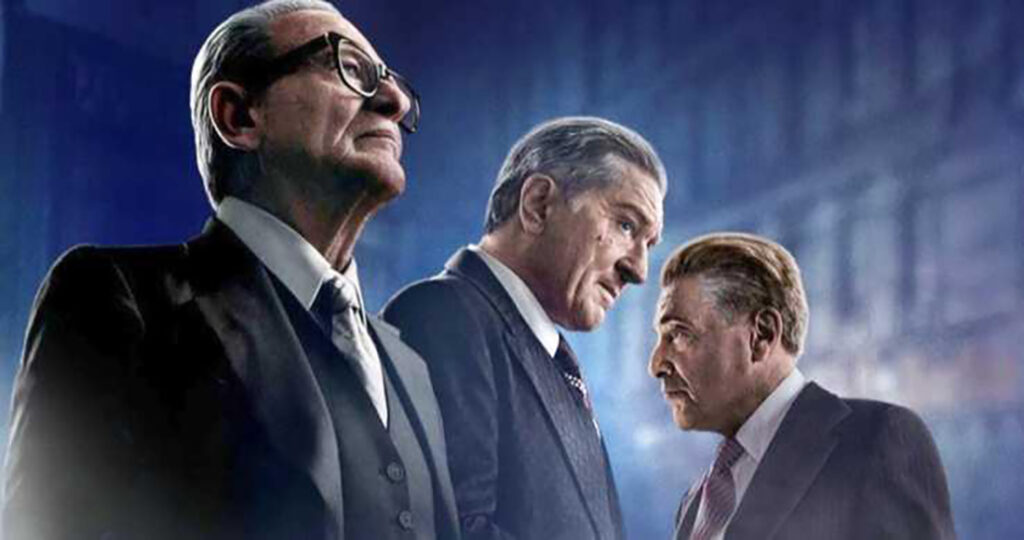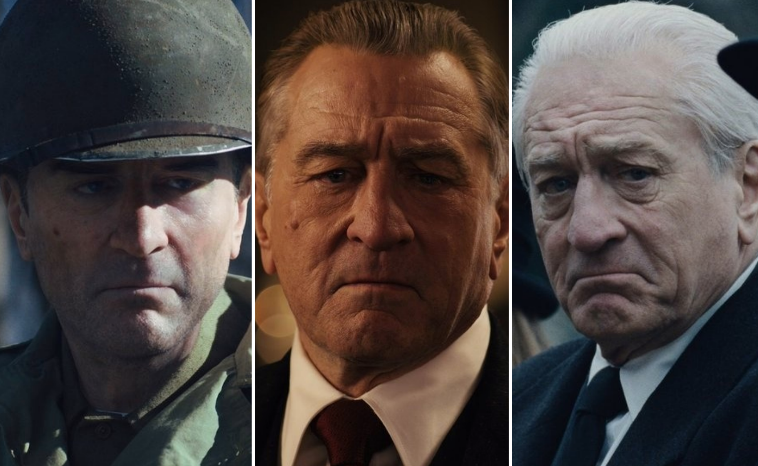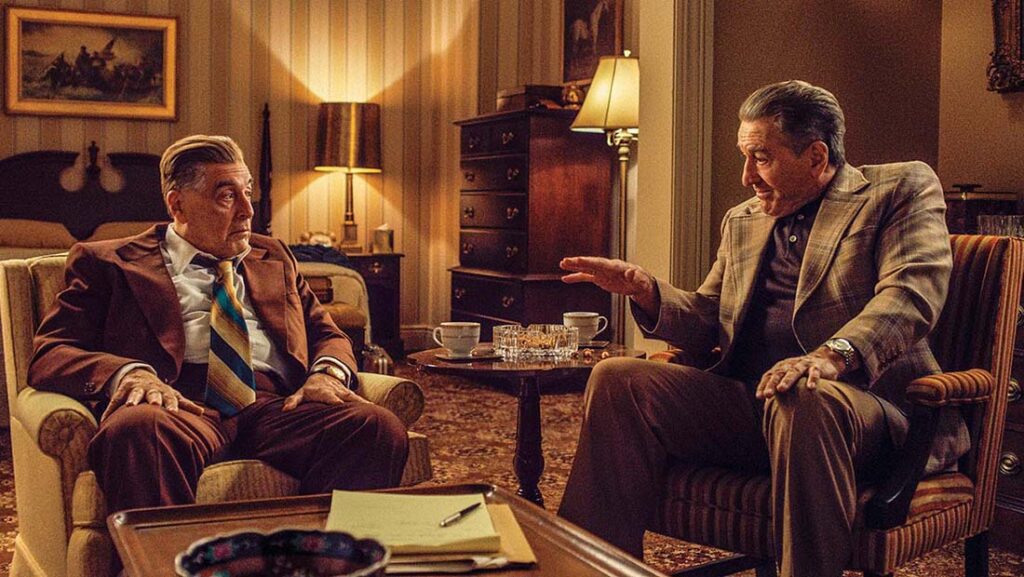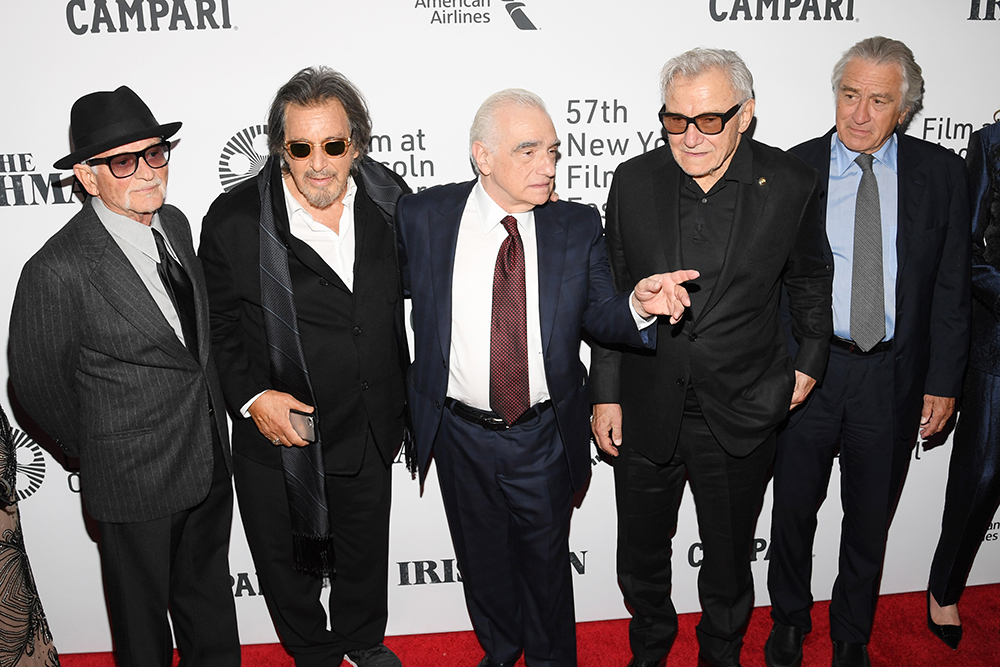Duel With Your Own Shadow

Henry Hill’s legendary confession line from the beginning of The Goodfellas: “As far back as I can remember, I always wanted to be a gangster”, to a large extent also referenced Martin Scorsese’s personality. It remains noted that his childhood spent on the sidewalks of New York could easily draw him to the crime world. He never hid his fascination with characters from that milieu. He was shown two more avenues of life – through the Catholic Church and through the cinema. Choosing the latter will result in one of the most widely acclaimed oeuvres in film history.
However, all those who, for their own reasons, hastened to declare The Irishman a masterpiece and label anyone who thinks differently a heretic, will need a plenty of arguments, for it is more than obvious that many things do not work with this film.
With a hefty self-control, Scorsese is simultaneously trying to build on The Goodfellas and Casino, but also by deviating from them, somehow to round out his informal gangster trilogy.
Something similar once happened to Coppola with The Godfather 3, which at the time came, much like The Irishman now, too late, though Scorsese had far more room to maneuver compared to the last part of Copolla’s saga.
At the concept level, with the re-engagement of Robert De Niro and Joe Pesci in the mafia milieu and with the use of an almost identical formal model, even Casino brought a certain disbelief already.
It was only for his great talent, that Martin Scorsese succeeded in doing almost impossible – by repeating a much identical film, he made The Goodfellas and Casino largely unforgettable movies.

Of course, the problem of The Irishman is not its duration, but the way the length of the film is structured, for this is truly not like some of the Scorsese’s favourite long films, such as Lean’s Lawrence of Arabia, Peckinpah’s Wild Bunch, Sergio Leone’s Once upon Time in the West and Once upon Time in America, or even his own Goodfellas and Casino – movies for which we, unlike for The Irishman, would never wish to end.
The departure from The Goodfellas and Casino is likewise merely an attempt, as Scorsese fails to do the same within the same genre and similar themes, which Peckinpah once succeeded, with his renegade westerns such as The Wild Bunch or Pat Garrett & Billy the Kid (another one of Scorsese’s favourites) where he made a similar but very different movie at the same time, changing the poetic and yet rather classicist dramaturgy of The Wild Bunch for the equivalent of pure poetry, such as Pat Garrett & Billy the Kid.
With the greatly anemic The Irishman – Scorsese adds the theme of aging to the former fervor and originality in the demystification of gangsterism, thus making his film more subtle, but as De Niro’s character has aged so strikingly as a gangster, through the three non-linear dramaturgical streams of Once Upon a Time in America, the whole thing becomes even more aggravating.

Leone’s fairy-tale and dreamlike vision remains elusive, among other things, because Sergio has succeeded in philosophizing on the subject of time itself, beyond the primal gangster story, which, with a similar experimental treatment of tempo from Once Upon a Time in the West, makes him unsurpassed. The pale outlines of all this might be noticeable in The Irishman, but solely as indications. They act more as a coincidence or as a mistake.
The formal virtuosity and thematic provocation of The Goodfellas and Casino have been replaced by lethargy. Scorsese somehow managed not to collapse into a kind of dramatic black holes on a couple of occasions. Yet, he even succeeded in making the undeniable intrigue of Jimmy Hoffa, the Kennedys and the Mafia, comparable to how Coppola once treated the mafia as a metaphor for America, absoultely uninteresting, reminding us how the good movie had been made from the similar material by none other than Danny De Vito. If Martin Scorsese had signed Hoffa instead of De Vito, that movie would have been proclaimed a masterpiece.

Too much implied interaction was attempted among the characters in The Irishman. There is simply not enough of Russell Bufalino in the film, as well as of the character of the daughter, who is marked as the moral center of the film, and yet unacceptably left out for too long and then quite expectedly used for a shaky epilogue.
And yes, there was finally a collaboration between Al Pacino and Martin Scorsese, and that’s probably the only curiosity of the movie, but Pacino has long been not what he used to be and only partially manages to portray his proverbial affections in acting as Jimmy Hoffa’s elevated temperament.
With very few exceptions, De Niro’s acting has been in a state of hard-to-digest mannerism for the past twenty-five years, and even his ninth collaboration with his old friend Scorsese hasn’t changed that fact. That variation of the very same grimace is more suitable to comedies (that he once feared of), and only manages to leave us in a dilemma – whether the forcing of distinctive facial expression caused him to do it, or vice versa. His tendency to „overact“ can not dispute the fact that he is among the actors with the highest number of significant films. If he by any chance had stopped acting in the first half of the 1980s, De Niro’s earlier ingenuity would have remained forever in the inevitable titles such as: Mean Streets, The Godfather 2, Taxi Driver, 1900, The Deer Hunter, Raging Bull, Once Upon a Time in America, The King of Comedy, just as he would have remained among the most important and influential actors of all times.

Joe Pesci probably did the best. After running out all the possible demons with Scorsese in his brilliant episodes in The Goodfellas and Casino, he plays a very different character here, and most importantly – utterly convincing.
The Irishman is more suited to television, although at times it even resembles radio drama. However, it would not come relevant even in the world of television, for by no means could it be compared to the top series like Boardwalk Empire, which again – a sort of consolation to Scorsese, probably wouldn’t be there without him.
Finally, the expensive rejuvenation technique also proved to be inappropriate because nothing could hide those aged bodies. Unnecessary and hesitant to tackle the legacy of his films such as The Goodfellas and Casino, Scorsese’s barely watchable The Irishman, despite all its expectations, leaves a pale impression and makes us wonder at that logistical backing, Netflix’s $160 million finances, almost unanimous criticism glorification, that all point us to one – the logic of corporate capital.
Betraying the hopes of the cinephiles, The Irishman fails to point to the unmatched importance of Martin Scorsese and Robert De Niro, that was however confirmed by none other than Todd Phillips’s Joker, where mastership of the cult Taxi Driver and the never-enough-praised King of Comedy may surely be recalled.
PREVIOUS:


My spouse and I stumbled over here different web page and thought I may as well check things out. I like what I see so now i am following you. Look forward to exploring your web page again.
Thank you for your kind words! We are very glad to hear it. Cheers!
I came up with a somewhat different conclusion, though I entirely appreciate your thoughts.
Impressive observation. Bravo!